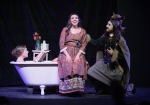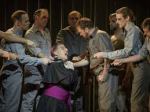Presented by Flipside Opera, in the Great Hall at Canadian Mennonite University, Winnipeg Canada, Fri. Feb. 24th
Ruminations by Neil Weisensel
The first (of many) things I liked about this performance of Manitoba-born composer John Greer’s songs, was the venue. The Great Hall at Canadian Mennonite University (full disclosure: I teach theory and composition at CMU) is warm and inviting, with a beautiful “oldness” and a certain stature about it. I was able to snag one of the coveted “comfy chairs” at the back. I listened to this concert in the most comfortable plushness imaginable.
Everyone at Flipside Opera is to be commended for this performance. There is so much good to say, I don’t know where to start. As a composer, I listen to music differently than most people, and I will get to the music, but first I must congratulate the Flipside Artistic Triumverate of Judith Oatway, Dawn Bruch and Lisa Rumpel. There are many, many fabulous songs by John Greer to choose from, but I really felt that the songs chosen were so suited to each performer, like a glove. So bravo for that, and also for choosing such a lovely space, and for making the intermission a real pleasure with homemade goodies to savour!
Every one of the performers was a standout, IHMO (warning: this might sound like a gush). Right off the mark, the velvety sound of Jessica Kos-Whicher matched the plump plushness of my comfy chair. Ms. Kos-Whicher, besides having a very beautiful and controlled voice, is also a gifted actor. She wrung every bit of (melo)drama our of Mr. Greer’s songs, set to devastatingly clever texts of Sarah Binks (herself an invention of novelist Paul Hiebert) referencing pig calls, lamenting a lost calf (way funnier than it sounds), a horrendous mistranslation of Heinrich Heine, and a square dance.
Judith Oatway was next, with a very different set of three songs with mid-19th century texts by Anna Bromwell Jameson. Ms. Oatway’s instrument is so polished, so beautiful, that she can seemingly do anything with it, always at the service of the music. Such a combination of richness and superb control is not often found – her diminuendo to nothingness on a high note had me and my professional tenor seatmate nodding in admiration. These songs were powerful, dramatic, and profound.
Mr. Greer possesses a full palette of harmonies, textures, literary and musical borrowings and puns that he uses in his songs, and an amazing craft when it comes to writing for the voice. Part of the reason the singers sounded so good, was that the music is so well written. His often technically challenging accompaniments, whether for one pianist or two, always set the perfect mood. More on the pianists, Lisa Rumpel and Laura Loewen, later.
Matthew Pauls, who premiered the role of Father Christmas in my most recent opera Merry Christmas Stephen Leacock, was next to take the stage. He presented three songs on texts from the First World War poet Wilfred Owen, whose writings were immortalized in Benjamin Britten’s colossal War Requiem. However, this was a lighter, more playful side of Owen, one song about children “romping” in and out of love, the other (Song of Songs) expressing thoughts about either a day, or a lifetime. These two songs were very different, but both handled very ably by Mr. Pauls. A voice professor at CMU, Mr. Pauls possesses a very rich and agile baritone, matched by an expressive presentation and impeccable diction. Another sign of good writing and good singing – I understood almost every sung word. (Flipside had also thoughtfully included a lyric sheet with the program.)
Next came Liebeslied-Lieder, a musical and literary pun on Brahms’ famous Liebeslieder Waltzes for piano 4-hands and 4 voice parts. Here, Mr. Greer’s invention was in full swing – from waltz to ragtime to schottische to tango to bolero to ländler, with some saucy textual turns: “Miss Twye was soaping her breasts in the bath” and witty rhyming schemes.
Mr. Greer’s eye for poetry is a fine one – he remarked in a pre-concert interview that he can tell within moments if a poem is speaking to him to be set to music. He has chosen some very fine poetry here, and much of his music has echoes of Canadian folksongs. It’s so fascinating to hear slight, subtle references to tunes you vaguely recognize, or when he wittily borrows music from himself (from another of his song cycles, it seemed…), or you think you hear a tune from Strauss’ Der Rosenkavalier. Or did you…?
No matter, the point is that this combination of craft and creativity is the reason that Mr. Greer is one of Canada’s most esteemed composers. With a career teaching at some of the best institutions in North America (including the Eastman School in New York City), we Manitobans are glad to claim him as “from here.” The prairies and Canada have obviously left an indelible mark on him, and we are glad of it, because I think art is at its best when it reflects us back at ourselves.
I won’t bore you with the scrumptiousness of the tasty treats on offer at the intermission. Suffice it to say that the large crowd at CMU’s Great Hall included a number of the city’s best singers – they knew what a treat they were in for.
The second half commenced with Aquatic Songs of the Canadian People, Old and New, including iconic tunes by Stan Rogers, Joni Mitchell, Allister McGillivary and Wade Hemsworth, featuring Ms. Oatway, Mr. Pauls and a new singer to my ears, Elizabeth Hoty-Surdhar, who played violin as adeptly as she sang. These songs, arranged adroitly by Mr Greer, absolutely shone in the hands (voices) of this group.
The Listener, set to a poem of Walter de la Mare, was one of the (many) highlights of the evening for me. Tenor Aaron Hutton has it all – good looks, fine acting chops, a great voice, and presence. I was so totally enraptured by the story he was telling, I forgot it was a song. It wasn’t really a song – it was more like an epic music-drama for one person. This was, I thought, Mr. Greer at his most personal, providing some of the most dramatic music of the night. (If this is a hint of what Mr. Greer’s operas are like, I’m already a fan!) Even though I was totally swept away by the performance, the analytical/composer side of me was still marvelling again at how well Mr. Greer writes for the voice, in this case in particular, writing for the lower register of the tenor. Mr. Hutton’s entire voice is strong, but especially in his lower regions, he had a resonance that was admirable. Ms. Loewen matched his intensity and depth of delivery every step of the way, it was a seamless presentation of “pianovoicesound.”
It’s difficult for me to sometimes succeed in combining a description of the artistry of the moment, with the technique that makes it possible. Mr. Hutton delivered a superb performance of an extremely difficult song, even though most probably wouldn’t have realized that (except nerds like me) because the difficulty factor wasn’t even an issue for him, and therefore not an issues for us in the audience. We just gilt to sit and take it all in. How much fun to be the composer in attendance, hearing your music sung with such transcendence? That moment, ladies and gentlemen, is why we do what we do.
I wouldn’t have wanted to follow that performance. But Ms. Hoyt-Surdhar rose to the challenge admirably. She set out with another strong song, the first set to Kahlil Gibran’s On Children (from Houses of Tomorrow). Ms. Hoyt-Surdhar is a young singer, but possessing a captivating stage presence, beautiful presentation and a quick vibrato that is often a harbinger of an even more beautiful voice to come as her instrument matures. She certainly held her own in the ensemble work with the more experienced singers, and it was nice to see her shine on her own. Her performance of Midnight Prayer was striking in her development of the songs, the pacing, and the different colours she brought to the voice. It was so powerful, so profound, that I personally would have like to have a let a little more time elapse before launching into the last piece, a child’s rhyming song.
Last on the program was All Around the Circle, a Canadian Folksong Suite. This rollicking piece with the full complement of singers, and which featured the two pianists again sharing the piano bench (what fun that must be!), driving the songs through well-known Canadian treasures as I’s the Bye who Builds the Boat and Morning Dew.
(Kudos as well to dramatic consultant Keri-Lynn Friesen, who helped shape the big picture of the evening, and had a sure but invisible hand in making this so much more than just singers singing songs.)
It was in this last piece that I really was cognizant of how amazing the collaborative piano element had been in this concert. The textures, the sheer flood of notes, arpeggios, huge chords, massive scales, everything that Mr. Greer could think of, was handled with aplomb and incredible accuracy by Ms. Rumpel and Ms. Loewen. As a collaborative pianist myself, I know just how challenging it can be to play such a huge program. Never mind that the composer, a brilliant pianist himself, is sitting a few feet away – no pressure!
Even more amazing, Saturday night at the Winnipeg Art Gallery at 7:30 pm will see Ms. Loewen again at the piano, again performing a concert of all of Mr. Greer’s music. This time her collaborative piano partner will be Mr. Greer himself, and an amazing cast of top-drawer Winnipeg singers including Monica Huisman, Mel Braun, Sara Jo Kirsch, James McLennan, Donna Fletcher, Robert MacLaren, Lois Watson-Lyons, and Rosemarie van der Hooft. This is the World Premiere of “A Prairie Boy’s Life“, a musical (and visual apparently!) homage to William Kurelek.
WHAT. A .CAST. I’m jealous. Haha – no I’m not. Yes, I am. But mostly, I’m glad to see the best artists Winnipeg has to offer celebrating the music of John Greer last night and tonight, because I believe his music is a treasure. The pure Canadian-ness of his music, the artistry and technique, the style and knowledge of the voice that is evident in his music, demands the best performers to bring it to fruition. Last night was a demonstration of that. Tonight promises to be a huge vocal treat as well. I hope to see you there!


